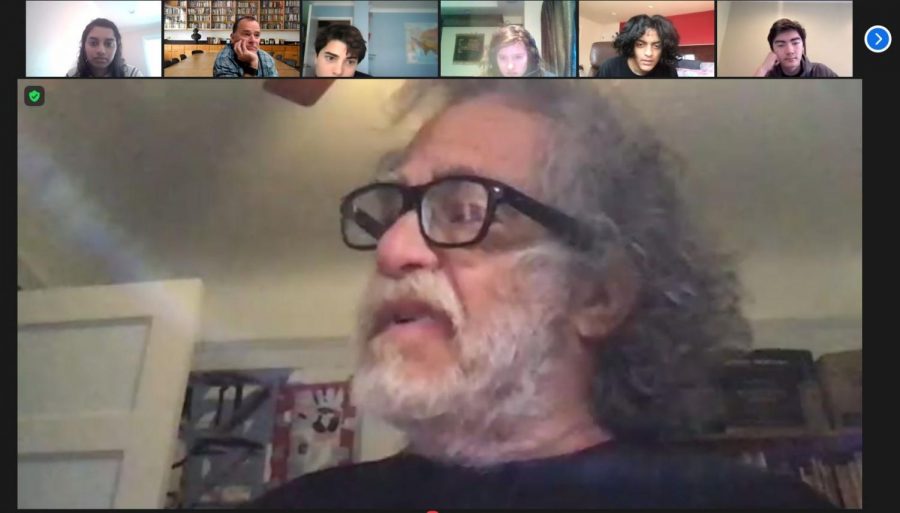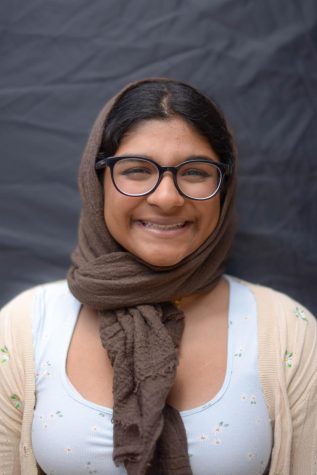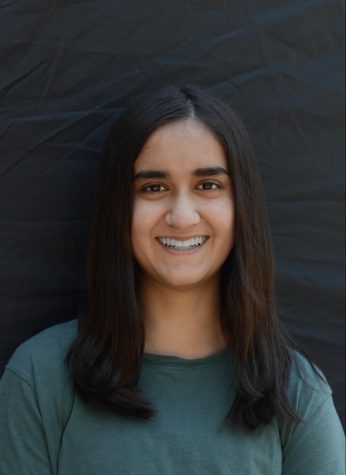The Poet’s Project: Beat Generation author Neeli Cherkovski finds the world through poetry
Neeli Cherkovski, renowned Beat Generation poet, speaks to students in Charles Shuttleworth’s Jack Kerouac class on Thursday, Dec. 1 during first period. Cherkovski read from his newest poetry book, “Hang on to the Yangtze River,” and also spoke about his life journey with poetry.
December 8, 2020
Poet Neeli Cherkovski recounts afternoons of picking lemons from a lemon tree in his home garden and listening to his little dog yapping at squirrels on his redwood deck in the distance. As hummingbirds flit and land in his homemade bird bath, he would scribble down notes about them in his notebook, making sense of the world and understanding where he belongs in it.
“It’s not that poetry is moral necessarily, but language tends to show us the universal,” Cherkovski said. “Poetry made me feel connected to everything — plants, animals and people all over the world — and it gave me a sense of freedom that I carried through the years.”
Cherkovski visited upper school English teacher Charles Shuttleworth’s Jack Kerouac English class on Thursday, Dec. 3. Cherkovski was part of the Beat Generation, a movement led by post-World War II literary artists who rebelled against societal beliefs of “normal” and embraced a new creativity in their work. Shuttleworth’s class is currently studying material from this time period, specifically, the works of Kerouac, and meeting Cherkovski allowed students to directly connect with their studies.
“[He talked about] writing and seeing the world around you and not expecting anything more. I found his simplicity towards life very admirable,” Benjamin Gicqueau (12), a student in the Jack Kerouac course, said. “He got really political at one point, as any artist does, and I think the way he expressed his beliefs and what an artist is in today’s age was really powerful.”
During his visit, Cherkovski read some of his poetry, specifically poems that tackled his experience of writing poetry itself. Cherkovski also discussed influences on his work, and he highlighted some Beat Generation poets with whom he interacted with, such as his former roommate Bob Kaufman, a prominent jazz performer in the 1960s.
Cherkovski’s journey with poetry began at the start of middle school. When other school subjects did not appeal to Cherkovski, he decided to read multiple books, and he started writing poetry at just 12 years old as a response to feeling a detachment from society and common societal beliefs. His poetry has helped him feel connected to the world around him.
“When I wrote a poem, it made me feel this is the important thing. [It] made me feel connected [with] everywhere in the world,” Cherkovski said. “I can see people in Africa, Asia, China, Europe, North America [and] Canada. We were all the same. We spoke different languages, but it was really the same thing we’re trying to say.”
Cherkovski realized his disillusionment with society after hearing racist ideas in school when he was younger, and his desire to oppose immoral and outdated societal ideas propelled him to join the Beat Generation.
“The key word is rebel. They were rebels against the dominant society and the idea of what is normal. You’re supposed to get a job, go to school, get married, in the army and all these things. [The Beats looked at] the idea of progress and self-advancement,” Cherkovski said. “They also looked at the world as beautiful, that you’ve worked with other people and that you did things with others. They believed in saving the environment.”
Cherkovski’s determination to speak out against societal beliefs of his time period that he opposed extends to today’s issues as well. He encourages the next generation to embody the characteristics of the Beat Generation, questioning the constructs around them to fuel greater change.
“I believe that young people—if they want to save themselves and the world—have to be rebellious against large corporations, against racism,” Cherkovski said. “They need to [understand that] we all breathe the same air and we all want the same things.”
He also appreciates literary works by other poets from around the world, such as Iranian poet Rumi, Greek poet Homer, English poet William Shakespeare, Chilean poet Pablo Neruda and Chinese poet Li Po. For him, their works emphasize equality, which also speaks to his message of fighting against racism.
“I tell people that as an American poet and as an English speaker, I have to [know] these other poets as well,” Cherkovski said. “I may not know the languages, but they’re just like I am or like you are.”
In his discussion with Shuttleworth’s Jack Kerouac class, he also highlighted the significance of reading older literature that is becoming less and less popular due to the rise of technology. While he acknowledges that the internet is important, he contends that books offer a unique connection.
“I think the internet can be very helpful, [but] it can be very dangerous, [and] it could sell us too much information. I hope that books are reborn and that people recognize the greatest thing of all is learning from oneself and from others. You’ve got to have room in which to think and to be yourself and to have your own ideas,” Cherkovski said. “The Greeks used to say in the ancient days, ‘Know thyself.’ That means studying your own mind as if it was a book because, in a way, it is.”
Students were able to connect this idea to their current studies as well as their personal understanding of the future.
“I think the main things that I took away from [his visit] was the importance of literature and documentation. We had a discussion about how books are kind of fading into obscurity due to the internet, how it’s important to still revisit some of these original texts as well, which I thought was really interesting,” Aditi Vinod (12), a student of the Jack Kerouac course who participated in the discussion, said.
Shuttleworth, who organized Cherkovski’s visit to his Jack Kerouac class, believed that Cherkovski’s insight would help the class get a richer perspective and understanding of the Beat Generation, which they could use to anchor themselves in their current research and studies for the course.
“It’s just an opportunity for them to talk to somebody who knew the people who are the subjects of their inquiries,” Shuttleworth said. “For instance, students are doing research projects on Lawrence Ferlinghetti, and Neeli Cherkovski wrote a biography of Lawrence Ferlinghetti — the first biography that had been written about Ferlinghetti.”
Personally, Shuttleworth enjoys Cherkovski’s poetry and believes in his ability to dive into poetry over the entire course of his life as well as write a variety of other genres.
“I have such appreciation for him, both as a poet, and as a biographer and a memoirist. He’s multi-talented in that sense, but at the same time, he’s really lived a life, a literary life,” Shuttleworth said.
In addition to his career as a poet, Cherkovski worked as a college professor for 14 years, and he has taught the University of California, Berkeley’s extension courses. His discussion with Harker seniors reminded him of his experiences working with college students — one of the most memorable moments for him during his visit was when students contributed to the discussion by asking questions.
“Throughout his visit, he was really engaging, and he also just told funny stories and showed his perspective being a poet and what his life has been like,” Jack Kerouac student Emma Andrews (12) said. “I think that’s something we don’t really get, especially at our school, and having the opportunity to have someone who lived through what we’re reading about was really cool.”


















![“[Building nerf blasters] became this outlet of creativity for me that hasn't been matched by anything else. The process [of] making a build complete to your desire is such a painstakingly difficult process, but I've had to learn from [the skills needed from] soldering to proper painting. There's so many different options for everything, if you think about it, it exists. The best part is [that] if it doesn't exist, you can build it yourself," Ishaan Parate said.](https://harkeraquila.com/wp-content/uploads/2022/08/DSC_8149-900x604.jpg)




![“When I came into high school, I was ready to be a follower. But DECA was a game changer for me. It helped me overcome my fear of public speaking, and it's played such a major role in who I've become today. To be able to successfully lead a chapter of 150 students, an officer team and be one of the upperclassmen I once really admired is something I'm [really] proud of,” Anvitha Tummala ('21) said.](https://harkeraquila.com/wp-content/uploads/2021/07/Screen-Shot-2021-07-25-at-9.50.05-AM-900x594.png)







![“I think getting up in the morning and having a sense of purpose [is exciting]. I think without a certain amount of drive, life is kind of obsolete and mundane, and I think having that every single day is what makes each day unique and kind of makes life exciting,” Neymika Jain (12) said.](https://harkeraquila.com/wp-content/uploads/2017/06/Screen-Shot-2017-06-03-at-4.54.16-PM.png)








![“My slogan is ‘slow feet, don’t eat, and I’m hungry.’ You need to run fast to get where you are–you aren't going to get those championships if you aren't fast,” Angel Cervantes (12) said. “I want to do well in school on my tests and in track and win championships for my team. I live by that, [and] I can do that anywhere: in the classroom or on the field.”](https://harkeraquila.com/wp-content/uploads/2018/06/DSC5146-900x601.jpg)
![“[Volleyball has] taught me how to fall correctly, and another thing it taught is that you don’t have to be the best at something to be good at it. If you just hit the ball in a smart way, then it still scores points and you’re good at it. You could be a background player and still make a much bigger impact on the team than you would think,” Anya Gert (’20) said.](https://harkeraquila.com/wp-content/uploads/2020/06/AnnaGert_JinTuan_HoHPhotoEdited-600x900.jpeg)

![“I'm not nearly there yet, but [my confidence has] definitely been getting better since I was pretty shy and timid coming into Harker my freshman year. I know that there's a lot of people that are really confident in what they do, and I really admire them. Everyone's so driven and that has really pushed me to kind of try to find my own place in high school and be more confident,” Alyssa Huang (’20) said.](https://harkeraquila.com/wp-content/uploads/2020/06/AlyssaHuang_EmilyChen_HoHPhoto-900x749.jpeg)








